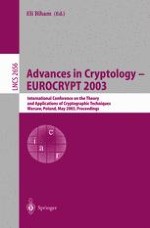2003 | OriginalPaper | Buchkapitel
On the Limitations of Universally Composable Two-Party Computation without Set-up Assumptions
verfasst von : Ran Canetti, Eyal Kushilevitz, Yehuda Lindell
Erschienen in: Advances in Cryptology — EUROCRYPT 2003
Verlag: Springer Berlin Heidelberg
Enthalten in: Professional Book Archive
Aktivieren Sie unsere intelligente Suche, um passende Fachinhalte oder Patente zu finden.
Wählen Sie Textabschnitte aus um mit Künstlicher Intelligenz passenden Patente zu finden. powered by
Markieren Sie Textabschnitte, um KI-gestützt weitere passende Inhalte zu finden. powered by
The recently proposed universally composable (UC) security framework, for analyzing security of cryptographic protocols, provides very strong security guarantees. In particular, a protocol proven secure in this framework is guaranteed to maintain its security even when deployed in arbitrary multi-party, multi-protocol, multi-execution environments.Protocols for securely carrying out essentially any cryptographic task in a universally composable way exist, both in the case of an honest majority (in the plain model, i.e., without set-up assumptions) and in the case of no honest majority (in the common reference string model). However, in the plain model, little was known for the case of no honest majority and, in particular, for the important special case of two-party protocols.We study the feasibility of universally composable two-party function evaluation in the plain model. Our results show that very few functions can be computed in this model so as to provide the UC security guarantees. Specifically, for the case of deterministic functions, we provide a full characterization of the functions computable in this model. (Essentially, these are the functions that depend on at most one of the parties’ inputs, and furthermore are “efficiently invertible” in a sense defined within.) For the case of probabilistic functions, we show that the only functions computable in this model are those where one of the parties can essentially uniquely determine the joint output.
